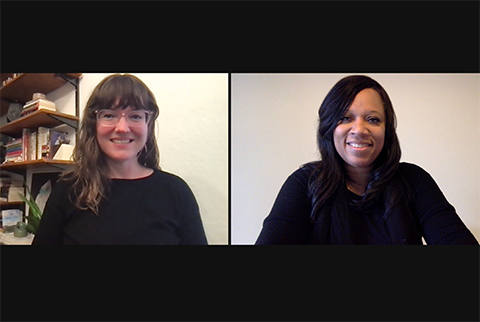AUSTIN, Texas (January 19, 2021) – Carrie Lou Garberoglio, PhD, was named director and principal investigator of the National Deaf Center on Postsecondary Outcomes (NDC) effective January 1, and Tia Ivanko, MA, NIC, ADAC, was named associate director and co-principal investigator.
NDC is a federally-funded technical assistance and dissemination center founded in 2017 to eliminate substantial gaps in education and employment between deaf and hearing people in the United States.
A deaf scholar and nationally recognized educational researcher, Dr. Garberoglio formerly served as associate director of NDC. She succeeds Stephanie W. Cawthon, PhD, who will now transition into new roles as founding director and strategic advisor.
“I am deeply honored to lead NDC through 2021 and beyond,” said Dr. Garberoglio. “My mission is always driven by the commitment to center deaf people in decision-making, which is especially important during the critical period after high school completion — the prime focus of NDC’s work.”
The transition to adulthood is also the topic of Shifting the Dialog, Shifting the Culture: Pathways to Successful Postsecondary Outcomes for Deaf Individuals, the critically acclaimed book Dr. Garberoglio co-authored in 2017 with Dr. Cawthon. To increase the quality of evidence-based practice in work that involves deaf communities, they also co-edited Research in Deaf Education: Contexts, Challenges and Considerations.
Expertise steeped in lived experience
As a child of deaf parents who were also educators in the deaf education system, Dr. Garberoglio’s first language was American Sign Language (ASL). Her first master’s degree is in Deaf Education and Deaf Studies from Lamar University.
Dr. Garberoglio, MA ‘12, PhD ‘13, is a second-generation alumnus of The University of Texas at Austin, where NDC is located. She earned her master’s degree in Program Evaluation and doctorate degree in Educational Psychology from the university. Her father, Walt Camenisch, MEd ‘78, completed his master’s degree while pursuing a landmark Supreme Court case to receive access to ASL interpreters for his classes at the university.
The author of more than 25 scholarly publications and a regular presenter at academic conferences, Dr. Garberoglio also remains committed to making her research accessible to deaf communities.
A passion for access and opportunity
Prior to her appointment to associate director and co-principal investigator, Tia Ivanko was NDC’s director of operations — tapping her expertise in program development and implementation, coordination and systematization skills, and her extensive experience in the field.
In her previous roles as a teacher in deaf education, a collegiate program director, and an ASL interpreter she has witnessed systemic barriers deaf people face in postsecondary settings. These experiences have served as catalysts for pursuing ways to improve accessibility and opportunities for deaf people. Both her professional and personal experiences yield a multifaceted viewpoint to understand stakeholders who rely on NDC’s expertise to provide the best quality services possible for deaf people.
Ivanko has worked for more than seven years under this federal funding line for technical assistance, concentrating on accommodation and accessibility practices, resource development, and innovative professional development for practitioners in the fields of deaf education and employment.
She earned her master’s degree in Deaf Education from Western Maryland College and has specialized training and certification in interpreting, ADA compliance, and deaf education.
“Access and opportunity are the cornerstones of NDC’s mission and are centered in the work I do,” said Ivanko. “I am thrilled to work alongside Dr. Garberoglio and our NDC team to create better experiences for deaf people in classrooms, on the job, and throughout their lives.”
About NDC
NDC’s team includes more than 20 deaf and hearing staff members, contractors, and interpreters working across four time zones to serve stakeholders with:
Hundreds of free, evidence-based resources.
Personal assistance and referrals.
Groundbreaking research and data.
Collaboration and engagement opportunities for local changemakers, state leaders, and national partners.








